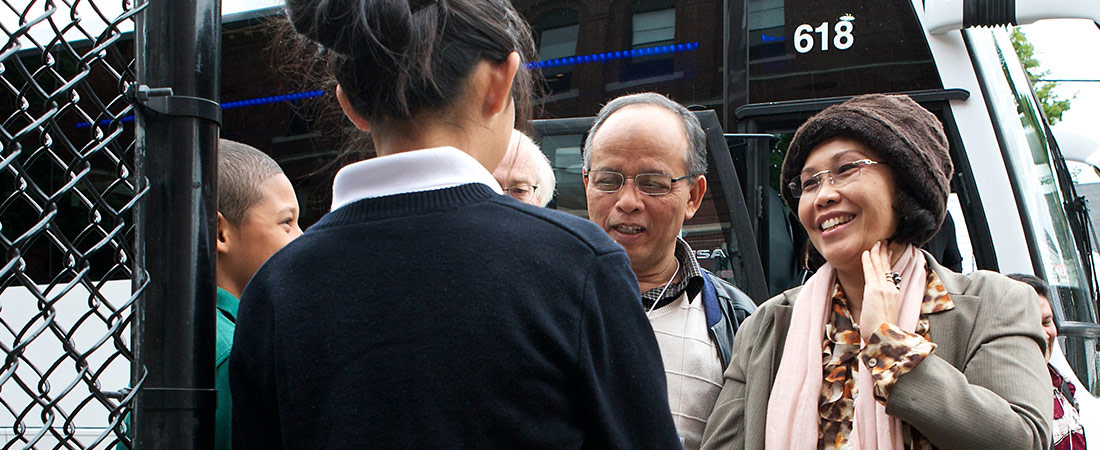For Delegation, Ed Reform is a Priority

Visiting Indonesian educators are greeted by St. Columbkille students.
On the sidewalk outside St. Columbkille Partnership School, girls in plaid skirts and boys in khaki pants could hardly contain their curiosity. That the visitors aboard the large white bus rolling toward them were educators, not pop stars, did not seem to dull their enthusiasm.
Inside the bus, the visitors—a group of 18 educators and administrators from Indonesia—were similarly eager. They had traveled a long way to visit this American school.
When the doors did open, these two groups hardly seemed like strangers. The students welcomed their guests with gentle handshakes and giant grins, saying “Welcome to St. Columbkille!” The visitors replied with wide smiles of their own.
The school visit was part of a week-long, USAID-funded study tour organized by EDC and RTI International as part of the PRIORITAS (short for “Prioritizing Reform Innovation and Opportunities for Reaching Indonesia’s Teachers, Administrators and Students”) project, a five-year effort to improve education in Indonesia. The educators were touring U.S. schools and institutions of higher learning to understand reform efforts in U.S. education and, perhaps, to bring some of these ideas back home.
At St. Columbkille, in Boston’s Brighton neighborhood, the educators learned about the small Catholic school’s unique blend of teacher preparation, teacher practice, assessment, and research—the result of the school’s partnership with nearby Boston College. While tour participants observed classrooms and students, Steve Anzalone, director of EDC’s Asia Regional Center, talked to individual teachers and Ministry members about what they were seeing—and why it was innovative.
Anzalone thinks that a partnership such as the one between St. Columbkille and Boston College could also work halfway around the world.
“They really want to learn how to embed professional development in the daily routine of teaching,” he said. “This trip reinforced the idea that the old ways—sending teachers out for a workshop, and then hoping they implement changes when they return—are not effective.”
In fact, EDC has a history of working with Indonesian educators. From 2005 to 2011, EDC staff conducted a technology-intensive professional development program for teachers, introducing many educators to online learning for the first time.
By contrast, the PRIORITAS study tour took a multi-level approach. The group met with students, teachers, administrators, staff developers, technologists, and policymakers—to name a few—to get a comprehensive look at how people at different levels are working together toward systemic improvement.
St. Columbkille was the first of many schools the educators visited. The next day, the group observed the technology integration and teaching resources available at the brand-new Natick High School. They attended lectures with leading educators at Harvard and MIT, and later in the week, traveled to two schools in Washington, D.C., to see models of academic support for at-risk students. Many schools in Indonesia struggle with technology integration, and few have the robust student support services that have become common in many U.S. public schools.
The central point behind all of the lectures and site visits? To show that education reform does not happen solely inside a school’s walls. And it doesn’t happen quickly, either. For Dr. Rochmat Wahab, rector of Yogyakarta State University, the importance of collaboration was a big takeaway.
“You have to have coordination between practitioners, administrators, and policymakers, or it doesn’t work,” he said.
Inspired by what he saw at MIT, Wahab talked about the promise of using online technology to reduce geographical barriers to learning. Then he added that he had already asked some librarians at his school to begin exploring more opportunities for online learning.
Anzalone believes that the trip was a positive step toward educational progress in Indonesia. The biggest victory may have been the relationships forged among tour participants, who will be responsible for advocating for reforms to teacher preparation once they return to home.
“We wanted to show them that if you are well organized and prioritize good practice, you can succeed in challenging circumstances,” Anzalone said. “There is good education going on in Indonesia. It just needs to happen in more places.”
